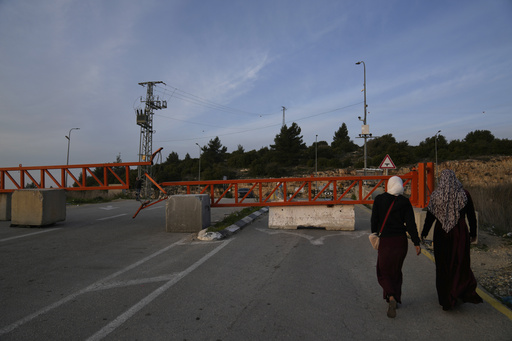
RAMALLAH, West Bank — Abdullah Fauzi, a banker from Nablus in the northern West Bank, begins his day at 4 a.m. to make it to work by 8 a.m. However, he frequently finds himself late. His commute has ballooned from a manageable hour to a grueling four-hour journey, thanks to the heightened Israeli military operations and the imposition of new checkpoints following Hamas’ attack on Israel on October 7, 2023.
This situation worsened considerably in the aftermath of the ceasefire in Gaza. Fauzi now faces a complicated drive to Ramallah, the West Bank’s hub for business and administration, that winds through difficult terrain and rural roads due to the increased security measures instituted by Israel. He expressed frustration at the Atara checkpoint last week, pointing to the lengthy delays caused by extensive searches of vehicles. “Whatever this is, they’ve planned it well,” he noted, emphasizing how these measures seem intentionally designed to disrupt their lives.
Despite the ceasefire between Israel and Hamas that began on January 19, the West Bank has seen rising tensions. Aggressive actions from radical Israeli settlers, fueled by unrest over the end of hostilities and the release of Palestinian prisoners, have continued. Following the ceasefire, Israeli defense forces bombarded the northern city of Jenin, a known hotspot for militant activity, leading to the establishment of numerous checkpoints that further isolate Palestinian towns. Historically accessible routes are now restricted, resulting in disproportionate disruptions for the local population.
The Israeli government justifies these security measures as necessary actions to prevent Hamas from extending its influence into the West Bank. Nonetheless, analysts suggest the crackdown is also a response to pressures from settler leaders advocating for hardline policies in the region. Observers like Tahani Mustafa from the International Crisis Group argue that these developments effectively facilitate long-desired goals such as settlement expansion and annexation.
Official statements from the Israeli military maintain that these checkpoints are crucial for ensuring safety and facilitating inspections. Military spokesperson Lt. Col. Nadav Shoshani has described them as a necessary tool in the fight against terrorism.
The impact of the checkpoints is acutely felt in daily life. Families find themselves separated, livelihoods threatened, and medical assistance delayed. Ahmed Jibril, who oversees emergency services for the Palestinian Red Crescent, shared his frustrations, noting that even his role could not shield him from the delays encountered at checkpoints, where ambulances often face waits for inspections.
In one tragic incident from January 21, a 46-year-old woman suffered a heart attack in Hebron and sadly passed away after being stalled at a checkpoint. The Israeli military was not familiar with the specifics of this case, yet they acknowledged that security screenings for medical personnel were a standard procedure, albeit one conducted to mitigate any delays as much as possible.
As of late November, statistics from the U.N. humanitarian agency indicated there were 793 checkpoints and roadblocks throughout the West Bank, representing a significant increase since hostilities in Gaza intensified. Reports continue to describe increasing restrictions as “suffocating,” highlighting a deterioration of daily life for many residents.
Once considered a haven amidst conflict, Ramallah is now feeling the strain. Residents are enduring endless queues and frustrating delays on their way to the simplest of errands. Mary Elia, 70, found herself waiting for two hours at the Ein Senia checkpoint, worried about her ability to meet her basic needs. “All we want to do is go home,” she lamented, expressing her anxiety about the barriers keeping her from family.
Amidst the traffic jams, a consistent voice over car radios keeps locals informed of the status of checkpoints, with updates frequently eclipsing the daily weather reports. Palestinian drivers have become hyper-aware of the intricacies of checkpoint life, forming a communal bond over shared frustrations and strategies for navigation.
For many, these delays are wreaking havoc on their work schedules and financial stability. Nidal Al-Maghribi, 34, voiced his despair over being unable to reach work on time, questioning how he could explain his absence to his family. The waiting vehicles, laden with perishable goods, face heightened scrutiny as soldiers frequently require inspections, resulting in losses and economic strain that ripple through Palestinian communities.
The Palestinian economy has contracted significantly, with reports indicating a 28% decrease last year due to Israel’s restrictive measures following Hamas’ attack. Officials note that the impact of these barriers does little to bolster security and instead serves to weaken the Palestinian economy and frustrate its people, prompting many to contemplate leaving their homeland.

